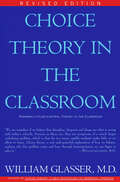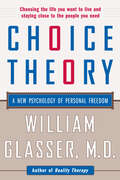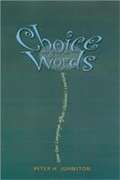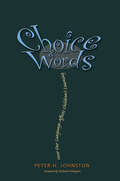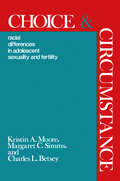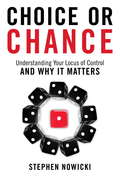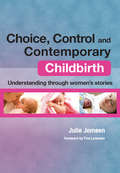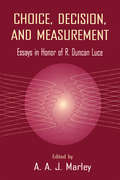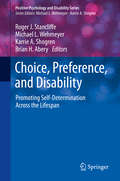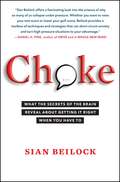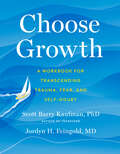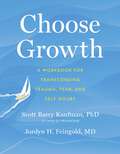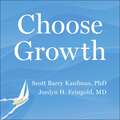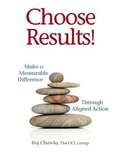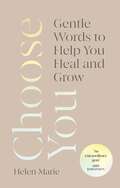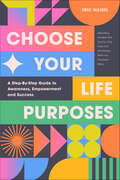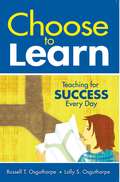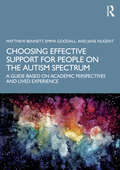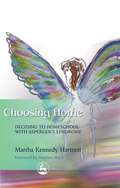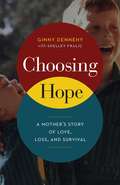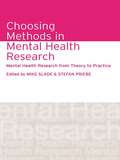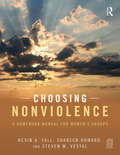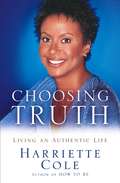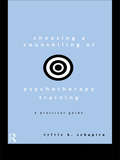- Table View
- List View
Choice Theory in the Classroom
by William GlasserWilliam Glasser, M.D., puts his successful choice theory to work in our schools--with a new approach in increasing student motivation. "Dr. Glasser translates choice theory into a productive, classroom model of team learning with emphasis on satisfaction and excitement. Working in small teams, students find that knowledge contributes to power, friendship and fun. Because content and the necessary student collaboration skills must be taught, teachers need to develop skills if they are to use this model successfully. The dividends are 'turned-on ' students and satisfied teachers."--Madeline Hunter, University of California at Los Angeles "Choice Theory in the Classroom is a landmark book, without question one of the most important and useful books for teachers to appear in a long while. Written with rare lucidity and grace, the book has numerous instantly usable ideas that will contribute fundamentally to the success of classroom teachers. William Glasser combines his extensive theoretical expertise and wide practical experience to provide a practical and illuminating guide for teachers [that] should be required reading in every college of education in the country."--David and Roger Johnson, University of Minnesota"Choice Theory in the Classroom presents an insightful analysis of what is wrong with traditional school and what need to be done about it. Dr. Glasser gives a compelling rationale for the use of learning-teams in schools to capture the excitement and commitment students display in sports but rarely in the classroom. The book is well written and persuasive. I hope every teacher in America buys it, believes it, and behaves accordingly."--Robert Slavin, John Hopkins University
Choice Theory: A New Psychology of Personal Freedom
by William GlasserDr. William Glasser offers a new psychology that, if practiced, could reverse our widespread inability to get along with one another, an inability that is the source of almost all unhappiness. For progress in human relationships, he explains that we must give up the punishing, relationship-destroying external control psychology. For example, if you are in an unhappy relationship right now, he proposes that one or both of you could be using external control psychology on the other. He goes further. And suggests that misery is always related to a current unsatisfying relationship. Contrary to what you may believe, your troubles are always now, never in the past. No one can change what happened yesterday.
Choice Words: How Our Language Affects Children's Learning
by Peter H. JohnstonIn productive classrooms, teachers don't just teach children skills: they build emotionally and relationally healthy learning communities. Teachers create intellectual environments that produce not only technically competent students, but also caring, secure, actively literate human beings. <P><P>Choice Words shows how teachers accomplish this using their most powerful teaching tool: language. Throughout, Peter Johnston provides examples of apparently ordinary words, phrases, and uses of language that are pivotal in the orchestration of the classroom. Grounded in a study by accomplished literacy teachers, the book demonstrates how the things we say (and don't say) have surprising consequences for what children learn and for who they become as literate people. Through language, children learn how to become strategic thinkers, not merely learning the literacy strategies. In addition, Johnston examines the complex learning that teachers produce in classrooms that is hard to name and thus is not recognized by tests, by policy-makers, by the general public, and often by teachers themselves, yet is vitally important. <P><P>This book will be enlightening for any teacher who wishes to be more conscious of the many ways their language helps children acquire literacy skills and view the world, their peers, and themselves in new ways.
Choice Words: How Our Language Affects Children's Learning
by Peter H. JohnstonIn productive classrooms, teachers don't just teach students math and reading skills; they build emotionally and relationally healthy learning communities. Teachers create intellectual environments that produce not only technically competent students, but also caring, secure, actively literate human beings. Choice Words: How Our Language Affects Children's Learning shows how teachers can accomplish this by using their most powerful teaching tool: language.Throughout this book, author Peter Johnston provides examples of seemingly ordinary words, phrases, and uses of language that are pivotal in the orchestration of the classroom. Grounded in a study by accomplished literacy teachers, the book demonstrates how and what we say (and don't say) have surprising consequences for what children learn and for who they become as literate people. Students learn how to become strategic thinkers, not merely learning the literacy strategies, but adapting them to their lives outside of the classroom.In addition, Johnston examines the complex learning that teachers produce in classrooms that is hard to name and thus is not recognized by tests, by policy-makers, by the general public, and often by teachers themselves, yet is vitally important. This book will be enlightening for any teacher who wishes to be more conscious of the many ways their language helps children acquire literacy skills and view the world, their peers, and themselves in new ways.
Choice and Circumstance: Racial Differences in Adolescent Sexuality and Fertility
by Margaret C. Simms Kristen A. Moore Charles L. BetsyFirst published in 1986. Forty five percent of black women have at least one child by the time they are turn twenty compared to 19 percent of white women. Eight-six percent of the births to black teens occurred to unmarried mothers compared to 30 percent among whites. Research shows that teenage childbearing has negative medical, social, and economic consequences and that women who first gave birth as teenagers are more likely to raise their families in poverty. In Choice and Circumstance the authors explore tree factors underlying the racial differences in the incidence of early childbearing; information about sex, pregnancy and contraception; need for family planning and abortion services; and motivation for postponing parenthood, including aspirations for schooling, employment plans and desire for children within marriage. They consider which teens postpone sex and pregnancy and why, and whether the kinds of motivation necessary to prevent early pregnancy vary by race in the United Sates, perhaps explaining the race differences in early childbearing.
Choice or Chance
by Stephen NowickiHow Much Do You Believe That What Happens to You Is the Result of Your Own Actions--or Do Circumstances Beyond Your Control Largely Determine Your Fate?Locus of Control (LOC) is a phrase used by psychologists to describe a widely effective way of assessing an individual's potential for success--personal, social, and financial. LOC measures how much you believe what happens to you is the result of your own actions or, conversely, of forces and circumstances beyond your control. People who accept that they are largely in control of their lives tend to do better than those who feel that fate or external factors rule what they do, especially in novel and difficult situations.This book explains LOC research, until now mainly confined to academic circles, in terms easily understandable to the average person. The author, a clinical psychologist who has spent nearly five decades investigating and writing about LOC, helps the reader to explore his or her own locus of control and what those orientations might mean for how life is lived. He discusses the extensively documented relationship between LOC and academic achievement, personal and social adjustment, health, and financial success. Dr. Nowicki notes that there has been an increasing tendency among Americans to feel as though their lives are slipping out of their control, and he identifies ways to reverse this negative trend.He describes how the Locus of Control is learned and demonstrates ways in which it can be changed to yield higher levels of achievement, success, personal satisfaction, and better interactions with others.From the Trade Paperback edition.
Choice, Control and Contemporary Childbirth: Understanding Through Women's Stories (Radcliffe Ser.)
by Julie Jomeen Lura L. PethtelCurrent maternity policy advocates choice and control for women in maternity care, and promotes women as active childbirth consumers and decision-makers. However, evidence that women receive true choice within contemporary maternity services is lacking, and continued and pervasive barriers to choice continue to have profound consequences for many. Choice, Control and Contemporary Childbirth explores the narrative childbirth experiences of a group of women, outlining current policy and providing an overview of the relevant discourses to which women are exposed when making choices for maternity care. This book is unique in presenting narratives that reveal varying identities for women across their maternity exerience, illustrating how maternity choices are simulataneously promised and constrained. It provides practitioners, service providers and policymakers in maternity care, and all those with an interest in birth provision, with profound insights into both women's experiences of childbirth and how choices can be better facilitated in future. 'Maternal choice and control are a challenge in contemporary society, with the changing demography of the population, the rising birth rate and financial constraints. Collecting this diverse information in one publication is timely and an invaluable resource for the practising and academically active midwives, obstetricians and health service managers.' - From the Foreword by Tina Lavender
Choice, Decision, and Measurement: Essays in Honor of R. Duncan Luce
by A. A. J. MarleyThis volume is the result of a conference held at the University of California, Irvine, on the topics that provide its title -- choice, decision, and measurement. The conference was planned, and the volume prepared, in honor of Professor R. Duncan Luce on his 70th birthday. Following a short autobiographical statement by Luce, the volume is organized into four topics, to each of which Luce has made significant contributions. The book provides an overview of current issues in each area and presents some of the best recent theoretical and empirical work. Personal reflections on Luce and his work begin each section. These reflections were written by outstanding senior researchers: Peter Fishburn (Preference and Decision Making), Patrick Suppes (Measurement Theory and Axiomatic Systems), William J. McGill (Psychophysics and Reaction Time), and W.K. Estes (Choice, Identification and Categorization). The first section presents recent theoretical and empirical work on descriptive models of decision making, and theoretical results on general probabilistic models of choice and ranking. Luce's recent theoretical and empirical work on rank- and sign-dependent utility theory is important in many of these contributions. The second section presents results from psychophysics, probabilistic measurement, aggregation of expert opinion, and test theory. The third section presents various process oriented models, with supportive data, for tasks such as redundant signal detection, forced choice, and absolute identification. The final section contains theory and data on categorization and attention, and general theoretical results for developing and testing models in these domains.
Choice, Preference, and Disability: Promoting Self-Determination Across the Lifespan (Positive Psychology and Disability Series)
by Michael L. Wehmeyer Karrie A. Shogren Roger J. Stancliffe Brian H. AberyThis book examines choice and preference in the lives of people with disability, focusing on people with intellectual and developmental disabilities. It provides an overview of choice and examines foundational concepts related to choice and preference, including self-determination and supported decision making. Chapters examine a range of critical service and policy issues, such as guardianship, individualized funding, the health care system, and the situation regarding choices for people with disability in international contexts. In addition, chapters explore issues ranging from the development of preference and choice in childhood to choices in older age and end of life matters. It provides in-depth analysis of particular choices faced at different points across the lifespan. The book concludes with implications for policy and practice. Topics featured in this book include:Supported decision making for adults with intellectual disabilities or acquired brain injury.The role of parents and families in the development of choice-making skills.Preference assessments for individuals who cannot tell us what they prefer.Employment opportunities for people with intellectual disabilities.Sexual and reproductive rights for people with intellectual disabilities.Disability and the choice to become a parent. Choice, Preference, and Disability is an essential resource for researchers, professors, clinicians, therapists, and other professionals as well as graduate students in the fields of developmental and positive psychology, rehabilitation, social work, special education, occupational, speech and language therapy, public health, and healthcare policy.
Choices, Values, and Frames
by Daniel Kahneman Amos TverskyThis book presents the definitive exposition of 'prospect theory', a compelling alternative to the classical utility theory of choice. Building on the 1982 volume, Judgement Under Uncertainty, this book brings together seminal papers on prospect theory from economists, decision theorists, and psychologists, including the work of the late Amos Tversky, whose contributions are collected here for the first time. While remaining within a rational choice framework, prospect theory delivers more accurate, empirically verified predictions in key test cases, as well as helping to explain many complex, real-world puzzles. In this volume, it is brought to bear on phenomena as diverse as the principles of legal compensation, the equity premium puzzle in financial markets, and the number of hours that New York cab drivers choose to drive on rainy days. Theoretically elegant and empirically robust, this volume shows how prospect theory has matured into a new science of decision making.
Choke
by Sian BeilockWhy do the smartest students often do poorly on standardized tests?Why did you tank that interview or miss that golf swing when you should have had it in the bag?Why do you mess up when it matters the most--and how can you perform your best instead?It happens to all of us. You've prepared for days, weeks, even years for the big day when you will finally show your stuff--in academics, in your career, in sports--but when the big moment arrives, nothing seems to work. You hit the wrong note, drop the ball, get stumped by a simple question. In other words, you choke. It's not fun to think about, but now there's good news: This doesn't have to happen.Dr. Sian Beilock, an expert on performance and brain science, reveals in Choke the astonishing new science of why we all too often blunder when the stakes are high. What happens in our brain and body when we experience the dreaded performance anxiety? And what are we doing differently when everything magically "clicks" into place and the perfect golf swing, tricky test problem, or high-pressure business pitch becomes easy? In an energetic tour of the latest brain science, with surprising insights on every page, Beilock explains the inescapable links between body and mind; reveals the surprising similarities among the ways performers, students, athletes, and business people choke; and shows how to succeed brilliantly when it matters most. In lively prose and accessibly rendered science, Beilock examines how attention and working memory guide human performance, how experience and practice and brain development interact to create our abilities, and how stress affects all these factors. She sheds new light on counter-intuitive realities, like why the highest performing people are most susceptible to choking under pressure, why we may learn foreign languages best when we're not paying attention, why early childhood athletic training can backfire, and how our emotions can make us both smarter and dumber. All these fascinating findings about academic, athletic, and creative intelligence come together in Beilock's new ideas about performance under pressure--and her secrets to never choking again. Whether you're at the Olympics, in the boardroom, or taking the SAT, Beilock's clear, prescriptive guidance shows how to remain cool under pressure--the key to performing well when everything's on the line.
Choose Growth: A Workbook for Transcending Trauma, Fear, and Self-Doubt
by Scott Barry Kaufman Jordyn FeingoldA research-based toolkit for turning challenging times into a springboard for healing, insight, and new beginnings.The trauma, loss, and uncertainty of our world have led many of us to ask life&’s big questions. Who are we? What is our higher purpose? And how do we not only live through but thrive in the wake of tragedy, division, and challenges to our fundamental way of living? Choose Growth is a practical workbook designed to guide you on a journey of committing to growth and the pursuit of self-actualization every day. Created by renowned psychologist and host of The Psychology Podcast Scott Barry Kaufman and positive medicine physician and researcher Jordyn Feingold, this is an evidence-based toolkit—a compendium of exercises intimately grounded in the latest research in positive psychology and the core principles of humanistic psychology that help us all navigate whatever choppy waters we find ourselves in. Topics include fostering secure attachment, setting healthy boundaries, practicing radical self-acceptance, and more—and each exercise is grounded in the latest research from the fields of psychology and positive medicine. Whether you&’re healing from loss, adapting to the new normal, or simply looking ahead to life&’s next chapter, this supportive and insightful guide will help you steer yourself to calmer waters—and deeper connection to your values, your life vision, and ultimately your most authentic self.
Choose Growth: A Workbook for Transcending Trauma, Fear, and Self-Doubt
by Scott Barry Kaufman Jordyn FeingoldA workbook to turn challenging times into a springboard for healing and new beginnings. The trauma, loss, and uncertainty of our world have led many of us to ask life's big questions. Who are we? What is our higher purpose? And how do we not only live through but thrive in the wake of tragedy, division, and challenges to our fundamental way of living?Choose Growth is a practical workbook designed to guide you on a journey of committing to growth and the pursuit of self-actualization every day. Created by renowned psychologist and host of The Psychology Podcast Scott Barry Kaufman and positive medicine physician and researcher Jordyn Feingold, this is an evidence-based toolkit-a compendium of exercises intimately grounded in the latest research in positive psychology and the core principles of humanistic psychology that help us all navigate whatever choppy waters we find ourselves in. Topics include fostering secure attachment, setting healthy boundaries, cultivating a growth mindset, practicing radical self-acceptance, and more - and each exercise is grounded in the latest research from the fields of psychology and positive medicine.Whether you're healing from loss, adapting to the new normal, or simply looking ahead to life's next chapter, this supportive and insightful guide will help you steer yourself to calmer waters - and deeper connection to your values, your life vision, and ultimately your most authentic self.
Choose Growth: A Workbook for Transcending Trauma, Fear, and Self-Doubt
by Scott Barry Kaufman Jordyn FeingoldA workbook to turn challenging times into a springboard for healing and new beginnings. The trauma, loss, and uncertainty of our world have led many of us to ask life's big questions. Who are we? What is our higher purpose? And how do we not only live through but thrive in the wake of tragedy, division, and challenges to our fundamental way of living?Choose Growth is a practical workbook designed to guide you on a journey of committing to growth and the pursuit of self-actualization every day. Created by renowned psychologist and host of The Psychology Podcast Scott Barry Kaufman and positive medicine physician and researcher Jordyn Feingold, this is an evidence-based toolkit-a compendium of exercises intimately grounded in the latest research in positive psychology and the core principles of humanistic psychology that help us all navigate whatever choppy waters we find ourselves in. Topics include fostering secure attachment, setting healthy boundaries, cultivating a growth mindset, practicing radical self-acceptance, and more - and each exercise is grounded in the latest research from the fields of psychology and positive medicine.Whether you're healing from loss, adapting to the new normal, or simply looking ahead to life's next chapter, this supportive and insightful guide will help you steer yourself to calmer waters - and deeper connection to your values, your life vision, and ultimately your most authentic self.(P) 2022 Penguin Audio
Choose Results!: Make a Measurable Difference Through Aligned Action
by Raj ChawlaChoose Results is a deeply considered call to action to leaders committed to improving people's wellbeing. Grounded in the fields of action learning, collaborative thinking, and collective action, Choose Results elucidates the necessary but difficult task of collaborating with others in ways that align action, de-emphasize the personal, and leverage parallel lines of work with in-depth examples from boots-on-the-ground work. This book provides methods, worksheets, and templates to give leaders the tools and practices they need to work effectively with multiple stakeholders and partners across bureaucracies big and small. With a focus on practice and application, Raj Chawla connects leaders' inherent passion for making a difference to the discipline of using data to inform decisions and the sometimes humbling vulnerability needed to choose results.
Choose You: Gentle Words to Help You Heal and Grow
by Helen Marie'An extraordinary gem' - ABBY RAWLINSON'Beautiful and nurturing' - ANNA WILLIAMSONAre you searching for inner calm or hoping to deepen your self-love? Are you looking to understand your emotions and set healthy boundaries?In Choose You, therapist Helen Marie's gentle, supportive bite-sized wisdom will encourage you to:- Speak to yourself with kindness- Learn to set boundaries- Step back to see things a little more clearly- Show up for yourself- Find moments of stillness- Take time to heal- Seek authentic connections- And treat yourself like someone you love.Featuring journal prompts, intuitive questions, reflective exercises and therapy-inspired lists for you to nurture your thoughts, this beautiful and soothing book has everything you need to begin your journey of understanding yourself and your needs better.
Choose Your Life Purposes: A Step-By-Step Guide to Awareness, Empowerment and Success
by Eric MaiselGo on a Journey Towards Personal Growth and Unlock Your Life&’s PurposeUnravel the myth of a singular life purpose ingrained in religious teachings and societal notions#1 New Release in Free Will & Determinism PhilosophyLiberate yourself from the "life purpose trap." Leading life coach, regular contributor to Psychology Today, and renowned author Eric Maisel presents a contemporary philosophy that challenges the conventional wisdom surrounding how to live. Discover the transformative philosophy of Choose Your Life Purposes. Explore the step-by-step process to identify your core values, unlocking what truly matters to you. This groundbreaking book empowers you to embrace multiple life purposes, fostering personal growth and awareness. No longer confined to endless seeking, you'll learn to live life now, irrespective of circumstances. How to live your best life. Explore the art of crafting life purpose statements, mantras, and icons to reinforce your choices. Make living with purpose a daily practice, transforming your life into a purpose-filled journey. Say goodbye to fruitless searches for meaning and embark on a personal growth revolution. Inside: Learn how to develop your personal values list Create a personal roadmap for a fulfilling and purposeful existence Have a guide at your fingertips on how to live with purpose daily Learn how to handle existential crises Acquire new tools to heal depression, anxiety, and addiction If you liked From Strength to Strength, How to Ikigai, or Creating a Life That Matters, you&’ll love Choose Your Life Purposes.
Choose to Learn: Teaching for Success Every Day
by Russell T. Osguthorpe Lolly S. OsguthorpeEducation becomes exciting and successful when both learners and teachers accomplish what they previously thought to be impossible. Written in an inspirational, compelling style, this resource shows educators how to motivate students to be successful learners through the development of key personal attributes that foster success. This user-friendly book is organized around an easy-to-use, research-based model derived from multiple fields, including education, psychology, and philosophy, and is focused around eight field-tested principles, including the "Three D's of Success"—desire, decision, and determination—that can • Increase every learner's self-confidence • Create new expectations and infuse students with new energy and motivation • Encourage individuals to go beyond familiar goals, take manageable risks, and achieve desired outcomes Choose to Learn gives teachers a proven approach for helping students exceed their expectations and experience academic growth by making a conscious decision to learn and to succeed.
Choosing Effective Support for People on the Autism Spectrum: A Guide Based on Academic Perspectives and Lived Experience
by Emma Goodall Jane Nugent Matthew BennettThis book is essential for anyone interested in learning about the therapeutic potential of orthodox and state-of-the-art supports for autistics. Using research evidence, supports are rated using a Gold, Silver, Bronze, and Tin category system. ‘Gold’ is extremely promising and use with confidence, whereas ‘Tin’ is extremely unsafe and potentially life threatening. This book, however, is more complex than just presenting literature reviews about supports for autistics and then rating the efficacy of the support. In addition to this, the insights and experiences of autistics about the autism supports examined are presented. Such testimonials provide an insider perspective from those who ultimately stand to benefit or suffer after receiving a support – namely autistics themselves.
Choosing Home: Deciding to Homeschool with Asperger's Syndrome
by Stephen Shore Martha HartnettMartha Kennedy Hartnett is the mother of a child with Asperger's Syndrome who made the courageous choice to homeschool. Emerging from the author's personal experience, this book is a step by step account of successful home education. Choosing Home will take you into the homes of Asperger families as they journey from survival of the playground bully to making it work at home. Hartnett embraces those pertinent questions raised by parents: Will I be limiting my child's emotional and social development? How will I know if my teaching is good enough? What if I can't cope? These questions and many more are answered in this touching and insightful narrative. This is a book of hope and encouragement to all parents with an interest in homeschooling.
Choosing Hope
by Ginny Dennehy Shelley FralicA chronicle of family love, unspeakable loss, and the power of healingGinny Dennehy was living the dream: a good marriage, two wonderful teenagers, a fulfilling career. Life in Whistler, B.C., seemed tailor-made for her outgoing, athletic family of four. But in 2001, the world turned upside down when her son, Kelty, committed suicide at the age of seventeen, hanging himself in the loft of their family home.Lost in a fog of grief, Ginny found the strength to go on. She poured her energy into the Kelty Patrick Dennehy Foundation, raising both funds and awareness to fight depression-related suicide by young people. And then, just eight years after losing Kelty, another unfathomable tragedy: her daughter Riley died of a heart attack in Thailand. She was just twenty-three.Candid and deeply moving, Ginny's powerful story will serve as an inspiration for others struggling with the weight of grief.
Choosing Methods in Mental Health Research: Mental Health Research from Theory to Practice
by Mike Slade Stefan PriebeChoosing Methods in Mental Health Research develops a new framework for mental health research. It is concerned with how to choose the most appropriate mental health research method, not only to address a specific question, but to maximize the potential impact on shaping mental health care. Mike Slade and Stefan Priebe focus attention on the types of audience that the researcher is seeking to influence, the types of evidence each audience accepts as valid, and the relative strengths and limitations of each type of methodology. A range of research methodologies are described and critically appraised, and the use of evidence by different groups is discussed. This produces some important findings about the interplay between research production and consumption, and highlights directions for future mental health research theory and practice. The findings presented here will be relevant to mental health service users and professionals who use research evidence to inform decision-making. It will also prove an invaluable resource for students and researchers in the field of mental health.
Choosing Nonviolence: A Homework Manual for Women's Groups
by Kevin A. Fall Shareen Howard Steven M. VestalAs mental-health professionals see increasing numbers of women arrested for domestic violence, the need for effective resources also increases. Choosing Nonviolence fills this void, providing an interactive and comprehensive treatment tool. If you are a group leader, Choosing Nonviolence will provide materials to deepen your current group curriculum. Interactive lessons and exercises cover important topics such as trust, respect, parenting, substance abuse, safety planning, and achieving nonviolence. Each chapter contains stories from actual group members to illuminate important dynamics as well as "tool" exercises designed to provide an opportunity for your group members to learn vital skills. If you are a group member, you will find this book to be an important supplement to the work you are doing in group. The personal stories from women who have been in group will show you how they have stumbled and succeeded on their path to change. You will get to learn from these experiences and will see how you can integrate the lessons into your own life. The exercises will enhance your participation in group, and the homework assignments will deepen your growth outside your counseling time.
Choosing Truth: Living an Authentic Life
by Harriette ColeLiving a Life that Matters -- to You In a world where "truth" is a relative concept, is it possible to live an honorable life? Where half-truths and relentless spin are the rule, is honesty really the best policy? Yes, says Harriette Cole, and in Choosing Truth she shows you why. The bestselling author of How to Be delivers an inspiring, one-of-a-kind prescription for revitalizing your daily routine, overcoming the habit of self-delusion, and living an authentic life. Choosing Truth is not simply about being honest with the people in your personal and professional life; it's about being true to yourself. Writing with extraordinary candor about her own life quest, Cole invites you to take an eye-opening, introspective journey and offers tips on reaching your goal, such as: Keeping a journal Cultivating the discipline of listening Loving yourself Letting go -- of clutter, of negative friends, of past mistakes Finding tools for honest communication Knowing when to speak up Choosing Truth is an essential guide for anyone who seeks to embrace authenticity and choose honesty.
Choosing a Counselling or Psychotherapy Training: A Practical Guide
by Sylvie K. SchapiraThere are a bewildering number of counselling and psychotherapy courses on offer: yet often trainees are not fully aware of the implications of their choice of course for their time, finances and future career until they have already begun training. Choosing a Counselling or Psychotherapy Training takes the reader through all the stages of the therapeutic training path, looking at everything from starting a course to employment prospects.Informative and realistic, the book includes:* Theoretical approaches to counselling and psychotherapy* Preparation for starting a course: costs and course content*Qualifications, registration, accreditation and research*Careers in therapyChoosing a Counselling or Psychotherapy Training is essential preparatory reading for all those embarking on counselling or psychotherapy courses, as well as for trained counsellors and therapists considering their career development.
